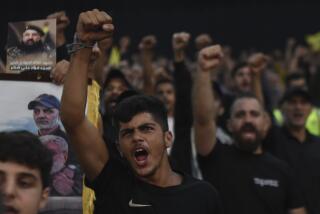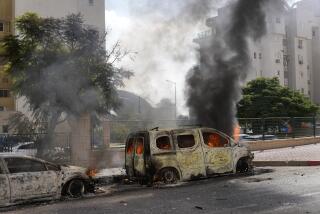Assassination ‘Best’ Tool Against Terror, Israeli Says
- Share via
JERUSALEM — A top national security adviser to Israeli Prime Minister Shimon Peres on Saturday questioned the advisability of military retaliation against Libya for last month’s attacks at the Rome and Vienna airports and said that “the best way, or let’s say the successful way, to combat terrorism” is by assassinating terrorist leaders.
The comments by Brig. Gen. Gideon Machanaimi came during an interview broadcast by Israel radio. As deputy adviser to the prime minister for anti-terrorist warfare, Machanaimi is the top professional in an office headed by a civilian political appointee.
He is believed to be the most senior Israeli official to have publicly endorsed assassination of terrorists in the wake of the nearly simultaneous Dec. 27 attacks by assault rifles and hand grenades that killed 15 air travelers, five of them Americans.
Assassination in Beirut
Israel is known to have used “hit squads” against terrorist leaders after the death of 11 Israeli athletes in the 1972 Munich Olympics massacre. One such team used a car bomb in Beirut in January, 1979, to kill the leader of the Black September terrorist group responsible for the Munich massacre.
In July, 1973, another Israeli assassination team operating in the small Norwegian holiday town of Lillehammer shot to death an innocent waiter in front of his pregnant wife in a case of mistaken identity.
Machanaimi acknowledged that “to eliminate (terrorists) is very complicated. It takes time. You have to use cooperation with other countries.” However, he added, “once . . . one of the leaders has been assassinated, we found a long period of peace in the area.”
Leading Israeli military journalists had previously raised the possibility of a cooperative effort to assassinate terrorist leaders in what some analysts here have interpreted as an invitation to the United States. However, it is unknown whether such an idea has been broached at an official level between the two countries.
‘A Legitimate Weapon’
“Today, the Israelis still regard assassination as a legitimate weapon in the war they wage against the Palestinians,” wrote Stewart Steven in his 1980 book on Israel’s intelligence service, “The Spymasters of Israel.”
“Any top Palestinian leader who organizes acts of terror against Israel knows that he must always go well guarded and that his life--as well as the lives of the young men he sends out on missions--is always on the line,” Steven wrote.
Machanaimi cautioned that “a military retaliation against Libya will not solve the problem” and said that “I personally don’t believe in retaliation as such.” He said that retaliation works only as part of a “comprehensive strategy against terrorism” which also includes diplomatic pressure and covert activity.
“The best way, or let’s say the successful way, to combat terrorism is to eliminate the leaders of the terrorist organizations or other functionaries in the terrorist organizations,” he said.
Abu Nidal Faction
The Israeli terrorism expert said “there is no doubt” that the men who attacked the Rome and Vienna airports belong to the Abu Nidal group, an extremist faction that broke away from the mainstream Palestine Liberation Organization more than a decade ago.
Machanaimi said that according to Israel’s latest information, the three men who attacked the Vienna airport arrived from Damascus, Syria, while the four who struck in Rome came from Beirut. He said that they used Tunisian passports that had been confiscated by Libya in March, 1985, and turned over to the Abu Nidal group.
In a subsequent telephone interview, Machanaimi said that the terrorists apparently picked up the weapons for their attack “from a local Abu Nidal infrastructure.” He said the weapons may have been smuggled into Europe by diplomatic pouch, but “we don’t know that for sure.”
Machanaimi dismissed Libyan leader Moammar Kadafi’s claim that Abu Nidal was not in his country. Kadafi is a “professional liar,” a “lunatic” and “unpredictable,” the terrorism adviser told Israel radio. “We believe (Abu Nidal) is somewhere in Libya,” he said.
More to Read
Sign up for Essential California
The most important California stories and recommendations in your inbox every morning.
You may occasionally receive promotional content from the Los Angeles Times.













